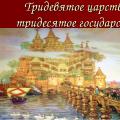From text to word. What does a person's native language mean? The role of a person’s native language a) Evaluative vocabulary
"Meaning native language in teaching foreign languages: problems, solutions and plans for the future." This was the name of distance learning scientific-practical conference, first organized at the Tashkent State University of Uzbek Language and Literature named after Alisher Navoi together with the editors of the electronic scientific and methodological journal and Internet portal “Uzbekistonda Khorizhiy Tilar” (“Foreign languages in Uzbekistan”). It was attended by university teachers, foreign experts and students.
At the opening of the remote conference, the Deputy Minister of Higher and Secondary special education Republic of Uzbekistan M. Karimov, rector of Tashkent state university Uzbek language and literature named after Alisher Navoi Sh. Sirojiddinov and others especially noted the high results of the reforms carried out in the educational system of our country, emphasized that the legal foundations of the study are increasingly strengthened foreign languages, the social importance of language learning among the population is increasing.
The fate of a people is inextricably linked with the fate of their native language. For the loss of one’s native language is the loss of the national spirit and history. The role of language in dialogue with other peoples, establishing friendly relations with them, and maintaining peace is invaluable.
The event discussed such topical issues as ensuring the implementation of the decree of the First President of our country “On measures to further improve the system of studying foreign languages” dated December 10, 2012 and the Decree “On the establishment of the Tashkent State University of Uzbek Language and Literature named after Alisher Navoi” dated May 13 2016, studying relevant international experience, the importance of the native language in the process of teaching foreign languages in the system of continuous education, as well as mechanisms for improving the quality of education in this direction.
- This scientific and practical conference differs from ordinary ones in that it allows the general public to engage in a virtual discussion at any time and anywhere through modern information technologies“, says Gulmira Shukurova, director of the electronic scientific and methodological journal and Internet portal “Uzbekistonda Khorizhiy Tillar”. - The event serves such purposes as increasing the status of the Uzbek language, increasing the interest of young people in learning foreign languages, and implementing innovative projects.
“A person who knows his native language well, as a rule, learns foreign languages faster and easier,” says Nancy Eckles, a professor at Azusa Pacific University (USA). - Uzbekistan has an effective education system, which allows young people to thoroughly study foreign languages.
The remote scientific and practical conference will last until April 28 on the website www.conference.fledu.uz
Deep silence, deep indifference, deep reverence, deep attraction, deep influence, deep attention, deep impact, deep indignation, deep excitement, deep admiration, deep impression... ... Dictionary of Russian Idioms
knowledge- absolute knowledge, brilliant knowledge great knowledge great knowledge comprehensive knowledge deep knowledge thorough knowledge vast knowledge thorough knowledge ... Dictionary of Russian Idioms
KNOWLEDGE- the result of the process of cognition, usually expressed in language or in k.l. iconic form. The desire to understand what knowledge is and how it differs from other products of human consciousness is already characteristic of the philosophers of antiquity, who raised and tried... Philosophical Encyclopedia
knowledge- KNOWLEDGE is a form of social and individual memory, a collapsed scheme of activity and communication, the result of designation, structuring and comprehension of an object in the process of cognition. The definition of the term “3.” is a fundamental problem... ... Encyclopedia of Epistemology and Philosophy of Science
Scientific knowledge- Science is a special kind of human cognitive activity, aimed at developing objective, systematically organized and substantiated knowledge about the world around us. The basis of this activity is the collection of facts, their systematization, critical... ... Wikipedia
Russian literature- I. INTRODUCTION II. RUSSIAN ORAL POETRY A. Periodization of the history of oral poetry B. Development of ancient oral poetry 1. The most ancient origins of oral poetry. Oral poetry creativity ancient Rus' from the 10th to the middle of the 16th century. 2.Oral poetry from the middle of the 16th century to the end... ... Literary encyclopedia
Brahma-madhva-gaudiya-sampradaya
Hare Krishna- Article on the subject Hinduism History Pantheon Directions Vaishnavism Shaivism Shaktism Smartism ... Wikipedia
Hare Krishna- Article on the subject Hinduism History Pantheon Directions Vaishnavism Shaivism Shaktism Smartism ... Wikipedia
Hare Krishnas- Article on the subject Hinduism History Pantheon Directions Vaishnavism Shaivism Shaktism Smartism ... Wikipedia
METHOD- (from the Greek methodos path, method of research, teaching, presentation) a set of techniques and operations of cognition and practical activities; a way to achieve certain results in knowledge and practice. The use of one or another M. is determined... ... Philosophical Encyclopedia
Books
- Language, knowledge, society: Buy for 303 UAH (Ukraine only)
- Language, knowledge, society: , . The book examines the problems of the relationship between language, knowledge and society in epistemology, philosophy of science, philosophy of consciousness, philosophy of language, sociology, logic and social anthropology.…
In the era of the latest achievements of civilization that we are experiencing, a truly deep knowledge of the native language and mastery of its literary norms remains a mandatory requirement for every educated person. This requirement is connected with a very important aspect - the ecology of language. Just as in nature there are maximum levels of air pollution, water pollution, and radiation accumulation, at which irreversible processes of destruction begin, so in language there are limits to its distortion, coarsening, and violation of semantic, stylistic and grammatical norms.
Slide 15 from the presentation “Problems of ecology of the Russian language”. The size of the archive with the presentation is 363 KB.Russian language 11th grade
summary other presentations“Unified State Examination in Russian Language 2009” - Read the text. Testing and measuring materials. Letter. Unified state exam in Russian language. One-time certification procedure. Expert training. Success in literature. Creation of CMM. Distribution of tasks by difficulty level. Main characteristics. Letter. Teacher. Technological certification options. Use of words. State final certification. On the use of the results of the Unified State Exam.
“B2 in Russian” - Characteristics of a word as a part of speech. A preposition connects words in a phrase. Basic particles. Write down the offer numbers. Write down the numbers of sentences with derived prepositions. Interjections. Indicate errors in identifying the highlighted parts of speech. Distribute grammatical features. System of parts of speech. Frequency examples service units speech. Complete the tasks. Basic unions. Read the sentences, indicate the parts of speech.
“Tasks in the Russian language for the Unified State Exam” - A simple sentence. Read the text. Productivity. Preparing students for the Unified State Exam. Comment on the problem. Evaluation paper. Workbook on the Russian language to prepare for the Unified State Exam. Workbook structure. Correct grammatical errors. Practical work. Efficiency. Grammar basis.
“Phonetics” - Letters e, e, yu, i. Phonetics. Features of Russian accent. Consonant sounds. Options. Emphasis. Problematic question. Compose the text. Language has its own colors. Changing the place of stress in a word. Central television announcer competition. Before voiced consonants, deaf people are voiced. Phonetic tasks. Summarize and systematize students' knowledge about phonetics. Stunning a consonant sound. Phonetic warm-up.
“Verb Signs” - Variably conjugated verbs. Conjugation of verbs. Infinitive. Perfective verbs are formed from imperfective verbs. The verb is in the imperative mood. At the end of verbs after consonants it is written ь. Verb tenses. Past tense. Verb. All verbs start in –it. Reflexive verbs. Person and number of the verb. Types of verb. Impersonal verbs. General grammatical meaning. Verb mood. Present and future tense.
“Essay-reasoning on the Unified State Exam” - The problem of moral values. Problems of choosing a book to read. A comment. Types of speech. Methods of preparation for writing an argumentative essay. Evaluation criteria. Problems posed by the author. Vocabulary work. Author's position. Semantic integrity. Argumentation. Essay plan.
Constantly living in the same environment does not make it possible to fully understand what the native language means to a person. When there are no difficulties in overcoming the language barrier, few people think about the role of communication for the psychological and moral state of each individual. Sometimes only the arrival of foreigners can shake confidence and peace. Even the slightest difference in languages with the inhabitants of the countries makes it clear how difficult it is for a person without understanding the speech of his interlocutor.
The importance of speaking skill in a person’s life
From birth, a child is instilled with knowledge and skills that will help in life. And speech is one of the most important skills that a small person masters. Remember how awkward you feel when you cannot understand what exactly a two-year-old child wants from you. Babbling and distorting words, he tries with all his might to convey his point of view, desire, emotions. And if it is simply difficult for adults to understand such a “conversation,” then it is sometimes even more difficult for a child. Despite all his efforts, he remained unheard. It is from this age that it is important to form in children an understanding of what their native language means for a person, to instill a love for words.
How to educate in your native language?
It is very important to help children learn the language. And this applies not only to the school curriculum. IN educational institutions teachers polish the basis the child has already received, expanding lexicon, correct some errors that are present in the speech of the child and his environment. But you cannot place all your hopes only on the school curriculum, which is limited by scope, time and methods. Teachers cannot always convey to their students the role of their native language in a person’s life. Discussions, reading, watching films, listening to songs in a relaxed home environment will be the key not only to spending time together, but also to preserving the native language.

The language of a people is a mirror of its soul, cultural heritage
Language is not only a tool for communication between different people. The meaning of the native language in a person’s life is much deeper and more important. He is the bearer of the culture, mentality, traditions and history of every nation. There are more than 6 thousand in the world different languages. Some of them are similar, and representatives of neighboring countries can understand oral speech each other in whole or in part, others are absolutely incomprehensible and have nothing in common with a person’s native dialect. Even within the same country, different dialects may be in use.

Each of them is the highlight of the region, its soul. After all, language is a reflection of the thoughts of both one individual person and a group of people, an entire nation. This is a defining component of national unity, uniting people who are different in spirit, way of existence, and social aspects. E. Sapir’s statement very characteristically describes the role of language in the formation of culture as a phenomenon and the culture of an individual person: “Culture can be defined as what a given society does and thinks. Language is how one thinks.”
Away is good, but home is better
The easier it is to understand what a person’s native language means, the further he is from his home. This problem is felt very acutely by emigrants who, due to various circumstances, were forced to leave their homeland. The need for communication, which cannot be fully satisfied by speaking a foreign language, pushes people to create interest groups, communities, and diasporas. Very often, such communities preserve centuries-old traditions much more reverently and reliably than their compatriots who do not experience difficulties of a similar nature.

It is very important to have the opportunity to hear, speak, and understand your native language every day. In it, it is a kind of path connecting him with home and loved ones. It is not for nothing that many, unable to bear the separation from their native land and suffering from nostalgia, are unable to settle down in a foreign land. Often the reason for this is not only the economic aspect, but different mentality and habits. The impossibility of free communication in the language in which you think becomes an insurmountable obstacle to permanent residence abroad.
After all, the lack of speaking practice, writing, and reading can lead to forgetting and distortion of even the native language that a person has been using since birth. Of course, some everyday phrases, absorbed with mother's milk, will not disappear forever, but vocabulary, the ability to speak freely and without an accent may be lost. It is all the more important to try to preserve a piece of your homeland, to cherish and glorify it through the word.
Is it necessary to teach a child their native language while living abroad?
For every person, their native language is the language they speak from birth, these are mothers’ lullabies, first questions and answers. However, what about children born in a country foreign to their parents, or those who moved to a new area while still a toddler? How to determine which language is their native language? How can you explain the difference between two different ways of expressing your thoughts and feelings?

The trends of the modern world are such that knowledge of several foreign languages is no longer a whim or desire of parents. Most often this is a necessity, without which adult life It’s hard to navigate and get a good job. Psychologists and teachers say that it is much easier for a child to learn a language than for an adult. Moreover, the basic foundation is laid at a very young age, even before school. The brain’s ability to perceive information in this period of life is colossal. Children living in a bilingual country or family can freely communicate both in the generally accepted language and in their native language.
It is very important for parents to pay a lot of attention to their native speech, because school and communication with peers will help the child speak competently and clearly in the language necessary for life. But a complete absence or lack of practice will lead to the fact that the native language is completely erased from memory, forgotten and the invisible thread connecting a person and his homeland is severed.
How to overcome the language barrier
Often communication problems arise due to a person’s inability to solve this problem. An extensive vocabulary, understanding of the basics of grammar, and ways of constructing sentences still do not provide the opportunity for free communication. Such difficulties arise due to a lack of understanding spoken language. The acquisition of the necessary skills occurs only during live communication, through reading fiction, periodicals, watching movies. At the same time, it is important not to forget to improve the pronunciation of individual words and phrases. What a person’s native language means will help you figure out the knowledge of several dialects. And only by feeling the difference can you really understand how much you love your country and its language.
 Erich Maria Rilke. Brief biography of R.M. Rilke. Paris. "New Poems"
Erich Maria Rilke. Brief biography of R.M. Rilke. Paris. "New Poems" Artania - the distant kingdom, the thirtieth state
Artania - the distant kingdom, the thirtieth state The beginning of the policy of dispossession
The beginning of the policy of dispossession